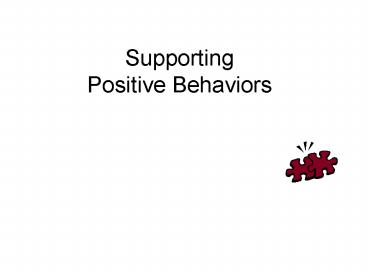Supporting Positive Behaviors - PowerPoint PPT Presentation
1 / 19
Title:
Supporting Positive Behaviors
Description:
Being present and participating in community life ... of humor Friendly Acknowledges social greetings Redirects nicely Very forgiving ... – PowerPoint PPT presentation
Number of Views:29
Avg rating:3.0/5.0
Title: Supporting Positive Behaviors
1
SupportingPositive Behaviors
2
A Person Centered PlanGeneral strategiesIndividu
alized approaches
3
Five Essential Goals ofPerson-Centered Planning
- Being present and participating in community life
- Gaining and maintaining satisfying relationships
- Expressing preferences and making choices in
everyday life - Having opportunities to fulfill respected roles
and live in dignity - Continuing to develop personal competencies
4
Gains
Smiles a lot Good eye
contact Seeks out social interaction
Good sense of humor Friendly
Acknowledges social
greetings Redirects nicely Very
forgiving
Respect!
- List any behaviors or characteristics of the
person that cause him/her to gain or lose respect
or his/her peers or adults. - Under Gains list those things you really like
about the person. - Under Loses list those behaviors that you do
not like to see.
Loses
Loud noises Flops
Zones out
Unaware of personal space Grinds teeth
Inappropriate touching
Inappropriate laughing/giggling
5
What are the ABCs of behavior?
- A Antecedent
- (what took place just prior to the behavior?)
- B Behavior
- (what behavior was exhibited?)
- C Consequence
- (What happened immediately following the
behavior?)
6
Antecedents
- Look carefully at the events prior to the
behavior occurring. - Some examples of what might trigger a challenging
behavior - Making demands on the person
- An activity that is not a preferred activity
- Maybe who they are with at the time
- Maybe because they are alone and want attention
- Or any multitude of things
7
Behaviors
- Destructive
- Disruptive
- Interfering Behaviors
8
- Conditions that increase likelihood behavior will
occur - (which can be true even for you or I)
9
- When presented with a demand (particularly 11
goals), Tommy will scream, yell out, and laugh to
obtain attention and to avoid doing tasks. - When making a transition to another environment,
Tommy screams to get adult and peer attention.
10
CONSEQUENCE
- What happens AFTER
- the behavior occurs?
11
(No Transcript)
12
WHAT WAS THE ENVIRONMENT?
13
Some Possible Prevention Interventions
14
Responding Strategies
- May require a change
- New ways to meet needs rather than reacting to
challenging behaviors
15
Lifestyle Interventions
16
- Good support plans
- Often take a preventive approach such as
Offering choices (activities, reinforcers) and - Demands become less aversive.
17
Personal
Choices
- What choices can the individual make within
his/her personal life? - Identify what choices are presented to the
individual within both areas.
Drink Snack Bathroom
Activity Reinforcers Clothing
Compliant or noncompliant
18
Outcomes
- Significant decrease in problem behaviors
- Increase in the use of replacement behaviors
- Increase in choice-making and task engagement
- Complies with initiating tasks
- Uses new behaviors in multiple settings
- Home, school, restaurants, activities, social
gatherings - Invited by friends to join in activities
19
When our children are happy, were all happy!
The end.































